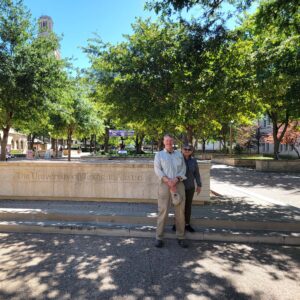
According to Merriam-Webster, retirement is defined as
1 a: an act of retiring: the state of being retired
b: withdrawal from one’s position or occupation or from active working life
c: the age at which one normally retires
reaches retirement in May
2 : a place of seclusion or privacy
GRADUATION RATHER THAN RETIREMENT
The reality is that, although my brother will no longer receive a paycheck, he, like I, will continue an active life. Ted is completing his textbook and working on a pending patent while I stay busy with several volunteer groups and my fiction writing.
I like to think of retirement as graduating to a different phase of life rather than withdrawing.
RETIREMENT MYTHS
George Jerjian has some wonderful comments about retirement myths:
Myth #1: Life follows a linear path. We are living much longer than previously thought. The idea that we obtain an education, get a job and marry, and then retire, living happily ever after is outdated.
The reality is that we never know when we are going to be hit by the turnip truck, so we should do something we enjoy every day. After graduating from the work world, we can still start businesses, make new friends, and enjoy different experiences.
I embarked on a non-linear path myself. After I officially retired, two clients circled back to me. I currently do EEO/Diversity training for one and worked as a part-time human resource manager for the other. I occasionally do that training free of charge for other organizations.
You can check out some unconventional retirement stories here.
Myth #2: You can’t teach an old dog new tricks.
Just because we have graduated does not mean we can’t expand our horizons. Exercising our brains is good for brain health and memory. Think hobbies, volunteering, or starting a charity or business venture—nothing is off limits.
Today, novel-writing and volunteering are my expensive hobbies and one of my guilty pleasures, besides reading daily, is to work online jigsaw puzzles.
Myth #3: Your 20s and 30s are your best years.
Did you know that up to half of the 5-year-olds in the U.S. today are expected to live to 100, according to Stanford’s Center of Longevity? We will not expire at the age of sixty-five so shutting down and waiting to die makes no sense.
Myth #4: There’s no point in thinking about death.
While we should not obsess about death, being mindful of it is important. Benedictine monks are encouraged to “keep death daily before your eyes,” so that they can live life more fully and in a detached manner.
Think about it. If we believe we are bulletproof and will live forever, we will never get around to doing the things we want to do. By then it is too late.
BEING HAPPY IN RETIREMENT
Janet Blaser has something to consider:
I’ve found that the best advice for a happy retirement is to be present and in the moment. Without outside expectations and schedules, with your time finally fully your own, at last you can try to create a new version of the life you always wanted.
FINAL THOUGHTS ON RETIREMENT
As the saying goes, getting old is not for sissies. But locking yourself away is not the answer. A large social network of friends of all ages is the key to living well.
Sign up on www.mariewatts.com to receive future Stories About Life delivered to your email address or read more stories by clicking here.

Recent Comments